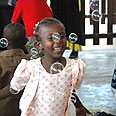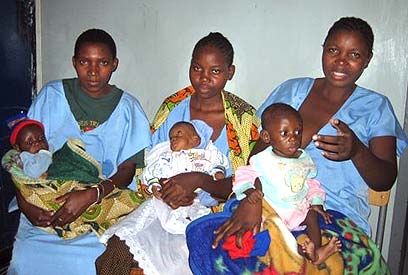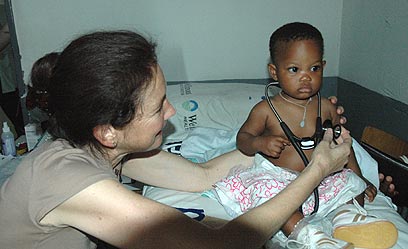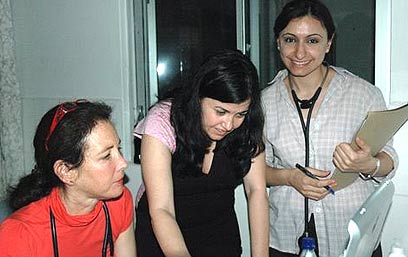
Making split-second, life or death decisions is hard on any doctor, but for Dr. Alona Raucher Sternfeld and Dr. Rula Awwad it was twice so. The two were sent on a mission to Africa, where they found themselves deciding the fate of dozens of children who suffer from heart disease.
Sternfeld and Awwad joined forces in February, as part of the Save A Child's Heart foundation's medical mission to Tanzania and Zanzibar, aimed at determining whether or not any of the children make good candidates for heart surgery in Israel.
The mission traveled to Africa equipped with two state-of-the-art Israeli made General Electric Vivid-I echocardiography machines donated by friends of Save a Child's Heart in Holland and GE Israel.
Those who were left behind, they knew, have very little to hope for. The journey, they said, was a life changing one.
"We have no idea how fortunate we are," said Dr. Sternfeld, a pediatric cardiologist from Wolfson Medical Center in Holon. "My children are fed and they have access to some of the world's leading medical services. I had two caesarean sections and made it through. Our children will never die of the diseases African children die of."

Candidates for heart surgery (Photos: Debra Silver)
Dr. Awwad, a pediatric cardiologist from Karitas Hospital in Bethlehem, has retuned thankful as well: "We, in the Palestinian Authority, complain about our own hardships, and with good reason, but you can’t imagine real poverty until you've been to Africa."
As part of the project, Dr. Awwad and Dr. Sternfeld have worked alongside each other at Wolfson Medical Center for three years.
First, do no harm
A doctor is a doctor and a patient is a patient regardless of nationality and origin, said Awwad. "When doctors work together they forget all their differences. We all worked together, so we could save just one more child."
The Save A Child's Heart foundation, which is a non-profit organization, has sponsored 1,800 surgeries for children in its 12 years.

Forced to make decisions immediately
The humanitarian outreach program, created by the late Dr. Ami Cohen, focuses its efforts on African and Palestinian children suffering from heart defects. This year's mission, which included Tanzania and Zanzibar for the first time, was joined by physicians from Israel, the PA, Holland and Germany.
"We had 100 children and 100 adults waiting for us when we got to the Zanzibar hospital," said Sternfeld. "They don't have phones in their homes, so about a week before we got there, the radio informed them we were coming.
"The ER was packed with beds and monitors which didn't work. They actually have some great equipment that was donated, but nothing works, because they have no one to fix it when it malfunctions.
"We saw 180 children, infants to 18-year olds, in the three day we were there," she added. "They were suffering from congestive heart failure and severe malnutrition. If these children would have undergone heart surgery at four-months old, their lives could have been so different."
Closing walls and ticking clocks
The schedule, continued Sternfeld, was hectic, sometimes grueling: "We knew we were these children's last hope and that we had to see them all. At one point there were 17 of us crammed into a 13-feet room, in 86 degree weather (30 degrees Celsius) with 90% humidity and no fan in sight and virtually no time.
"I give each child I see in Israel at least half-an-hour when I see them, but here we had no time to make any kind of personal connection with the children – they were undressed and anaesthetized before we even saw them."

Dr. Livia Kapusta from Holland who joined the mission in Tanzania, Dr. Sternfeld and Dr Awwad
Awwad found the expeditious pace difficult as well: "At home we have time to confer on cases and here we had to make decisions immediately… when I had to tell parents we couldn't operate on their children I felt like I was letting them down."
But not all was bleak. Both Awwad and Sternfeld were moved to meet two of the children who were operated in Israel in the past, like 17-years old Saida, who was operated six years ago. "All of a sudden we saw her there, with a one-year old baby in her arms," said Sternfeld.
"She made it through the pregnancy and childbirth and when I gave her an EKG, her heart looks great."















